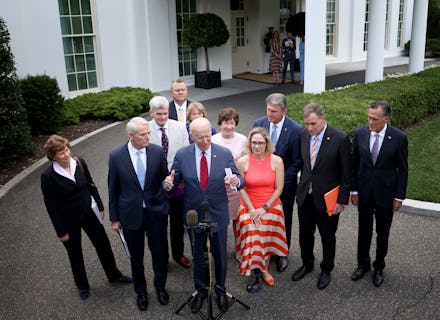Biden got his bipartisan infrastructure deal, though it's missing all the good stuff

"We have a deal," President Biden declared after meeting with a group of Republican and Democratic senators who have been working on a bipartisan infrastructure bill. The agreement, which will still need to pass through the split Senate and Democratic-controlled House of Representatives, includes more than $1 trillion worth of spending on infrastructure, including roads, public transit, and electric utilities. What it doesn't include, though, is basically everything liberals were hoping for.
Back in March, Biden introduced a $2 trillion spending bill aimed at addressing infrastructure in all forms. That included the traditional stuff — roads and bridges — but it also called for improvements to societal infrastructure, setting aside major funding for child care, health insurance expansion, and access to community colleges. The original proposal also put climate change front and center, focusing on weatherizing essential infrastructure and housing to protect from the worst effects of extreme weather and reducing the overall carbon footprint of transportation and construction. Most of that appears to be gone from this version of the infrastructure agreement.
Looking at Biden's initial proposal compared to the information available on the bipartisan agreement, it's hard not to think that Biden basically gave up on his most ambitious plans. A proposed $174 billion that was set to help incentivize consumers to buy electric vehicles appears to have been ditched entirely. Another $15 billion that was meant to build out the country's infrastructure to support electric vehicles, including a proposed network of 500,000 new charging stations, was cut in half to just $7.5 billion. A proposed $100 billion in funding for weatherizing the electric grid also seemed to have been gutted.
According to the Associated Press, Democratic Sen. Bill Cassidy of Louisiana said that the bipartisan bill should be viewed as a "beginning investment" in addressing climate change. But it's unclear when — or if — the next round of spending will come. With many of the biggest bits of spending on climate change and public initiatives stripped out, Biden and the Democrats will have to pass those plans in a separate bill. The theory is that spending to address climate change — as well as other human infrastructure including child and elder care, free community college, and expanded health insurance — will all get combined into a single package that Democrats will try to pass through Congress using reconciliation, which would allow the bill to be passed with a simple majority only. As long as the Democrats retain all 50 of their Senate votes, they wouldn't need a single Republican to sign on to the theoretical forthcoming bill, because Vice President Kamala Harris could cast the tie-breaking vote.
But holding onto all 50 Democratic is no guarantee. Sen. Joe Manchin (D-W.Va.) has been hesitant to commit to such a plan and is generally a thorn in the side of anyone who actually wants to get things done. For now, all Biden really won was a photo-op with a bipartisan group of senators and an infrastructure bill that seems like it is on track to pass. That is technically progress, even if it's wildly uninspiring — which is basically the Biden experience in a nutshell.